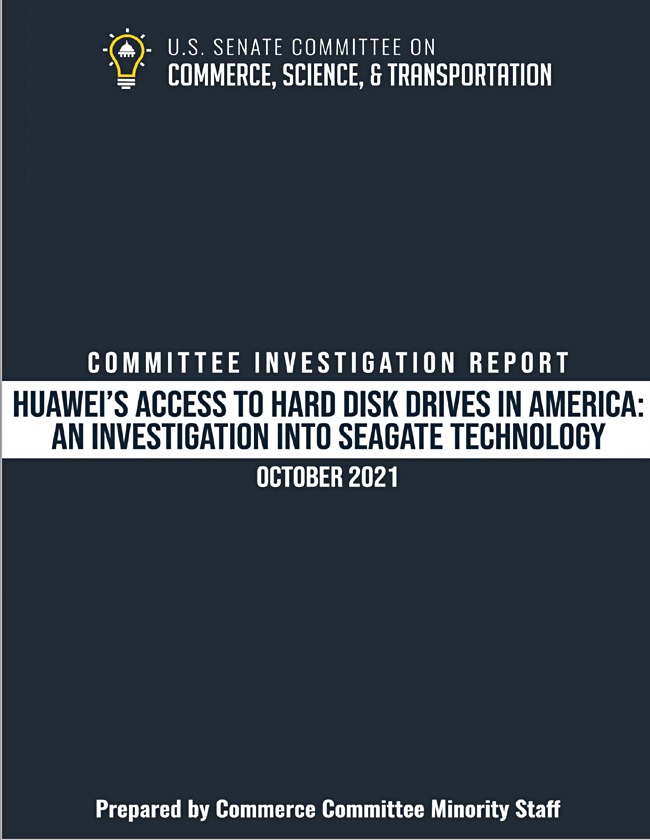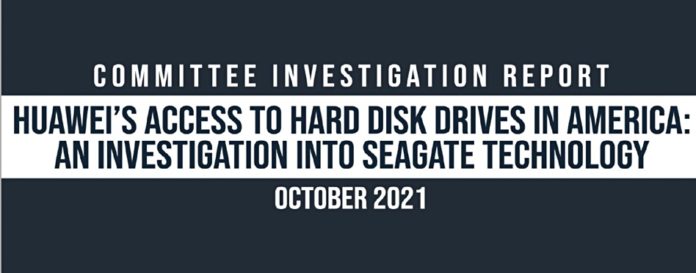A US Senate Republicans’ reports says Seagate broke trade rules supplying disk drives to Huawei.
Huawei was first put on a US trade blacklist in May 2019. Western Digital then stopped supplying its disk drives, SSDs and NAND chips to Huawei, halting a strategic co-operation agreement with Huawei which had only been signed in April. Shipments later resumed.
Toshiba temporarily suspended disk and semiconductor-based products shipments at that point but resumed after a few hours, believing that that no US sanctions were being breached.
Seagate did not cease its disk drive supply to Huawei, telling us it “complies with all applicable laws including export control regulations,” and adding: ”We do not comment on specific customers.”
In June 2020 Huawei was intending to use 20TB SMR drives in its OceanStor Pacific mass data storage array, thought to be sourced from Western Digital which was then shipping a DC H650 20TB SMR drive.
However, the Trump administration added 38 Huawei affiliates in 21 countries to the US government’s economic blacklist in August 2020. This raised the total to 152 affiliates. It also amended the Foreign Direct Product Rule tightening the restrictions on how technology could be supplied to Huawei.
Suppliers could ask for a license to ship technology devices to Huawei.
Republican Senator Roger Wicker, the ranking member of the Commerce Committee, said the 2020 Commerce Department regulation sought to “tighten Huawei’s ability to procure items that are the direct product of specified US technology or software such as hard disk drives”. He asked the CEOs of Seagate, Toshiba and Western Digital if their companies were improperly supplying Huawei with disk drives.
Responding to a Reuters query, Western Digital said it “stopped shipping to Huawei in mid-September 2020 to comply with new rules issued by the Department of Commerce. We requested a license to ship products to Huawei in September 2020. Our application is still pending.”
Seagate’s CFO, Gianluca Romano, said on a September 2020 Deutsche Bank call that Seagate was evaluating the situation and had not applied for any licence. He said at the time: “I don’t see any particular restriction for us in terms of being able to continue to ship to Huawei.”
The report
Republicans on the Committee have now issued a Minority report alleging Seagate did not comply with the regulations.

The report states: “Seagate officials told Minority Staff that the company does not hold a valid license to continue shipping hard disk drives to Huawei, likely making transactions for this product unlawful after the effective date.”
It continues: ”Toshiba and Western Digital, the other primary suppliers of hard disk drives, confirmed to the Committee that they ceased shipments to Huawei after the [Foreign Direct Product Rule] rule went into effect.
”Minority Staff estimate that Huawei spends around $800 million annually on hard disk drives for use in data centers, servers, and other bulk-data storage applications — demand prospectively met in large part by Seagate’s monopolisation of the market after the rule went into effect. By shipping these prohibited products to Huawei, it appears Seagate benefitted from an uneven playing field to the detriment of national security and at the expense of its competitors who abide by the rule designed to combat threats posed by companies with known connections to the Chinese government.”
According to the report: ”In an interview with Minority Staff on October 4, 2021, Seagate officials confirmed that the company has not applied for or obtained a license to ship items covered by the Foreign Direct Product Rule to Huawei.”
According to Wedbush Securities, which was quoted in the report: “[Seagate’s] legal team likely interpreted US restrictions differently than its peers.”
This later changed as, in September, Seagate representatives “disclosed that the company has stopped shipping hard disk drives to Huawei, but declined to provide the date that shipments ended.”
Interestingly the report indicates: ”Minority Staff subsequently received evidence indicating that Seagate may plan to resume shipments to Huawei once the Chinese company is restructured with an operational data server subsidiary to reroute hard disk drives through the supply chain. The purported intent is to avoid shipping the product through currently prohibited entities, even though the destination is Huawei.”
And it concludes: “Based on the evidence available to Minority Staff, it appears that Seagate Technology knowingly violated the Foreign Direct Product Rule for more than one year. Seagate likely made the strategic calculation to continue violating national security regulations based on the prospect of earning significantly greater profits through market monopolisation than the potential cost of regulatory penalties. All unlicensed shipments of prohibited products to Huawei should cease without delay.”
Comment
Wicker’s Minority Report has no regulatory status. It is being published to exert pressure on the US Bureau of Industry and Security (BIS) at the Department of Commerce to investigate Seagate’s shipments to Huawei and declare the company in breach of the regulations. BIS has no legal duty, as far as we know, to co-operate with such reports, and the report expresses some frustration with BIS’s lack of co-operation.
“Failure of BIS to provide clarity on the rule’s scope, in combination with the lack of enforcement actions taken against violators, has created a commercial environment that incentivises companies to continue shipping prohibited products to Huawei.”
BIS also told the Committee that “compliance investigations can take as many as five years to complete.”
The Committee took umbrage with this and the report’s final sentence states: “Minority Staff will continue performing oversight of BIS to determine why no enforcement action has been taken against Seagate Technology and to ensure the agency conducts thorough investigations at the scale and urgency required by the security interests at stake.”
Seagate’s lawyers are probably not shivering in their boots.








